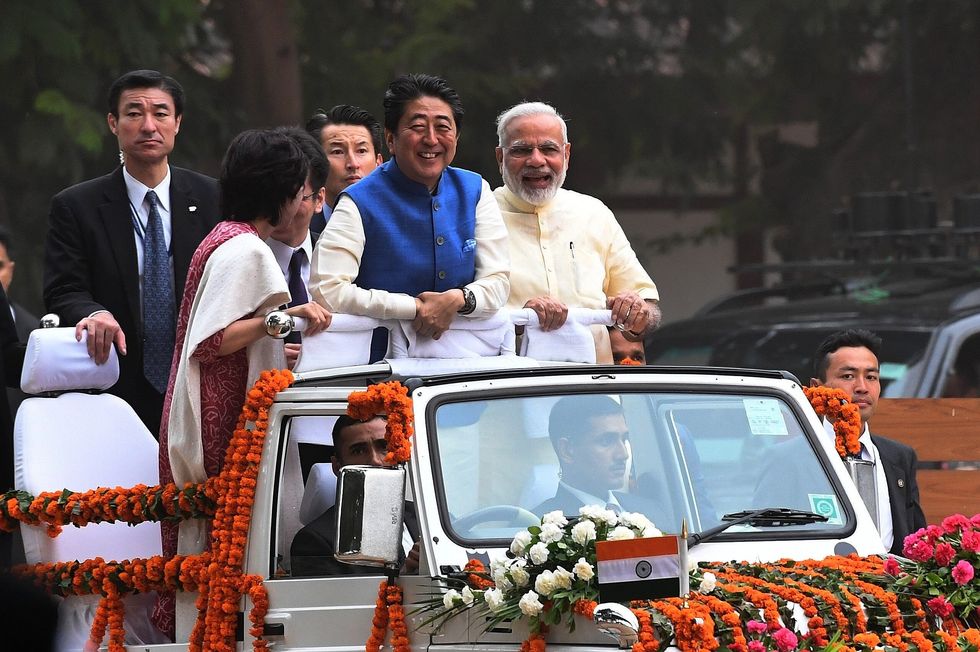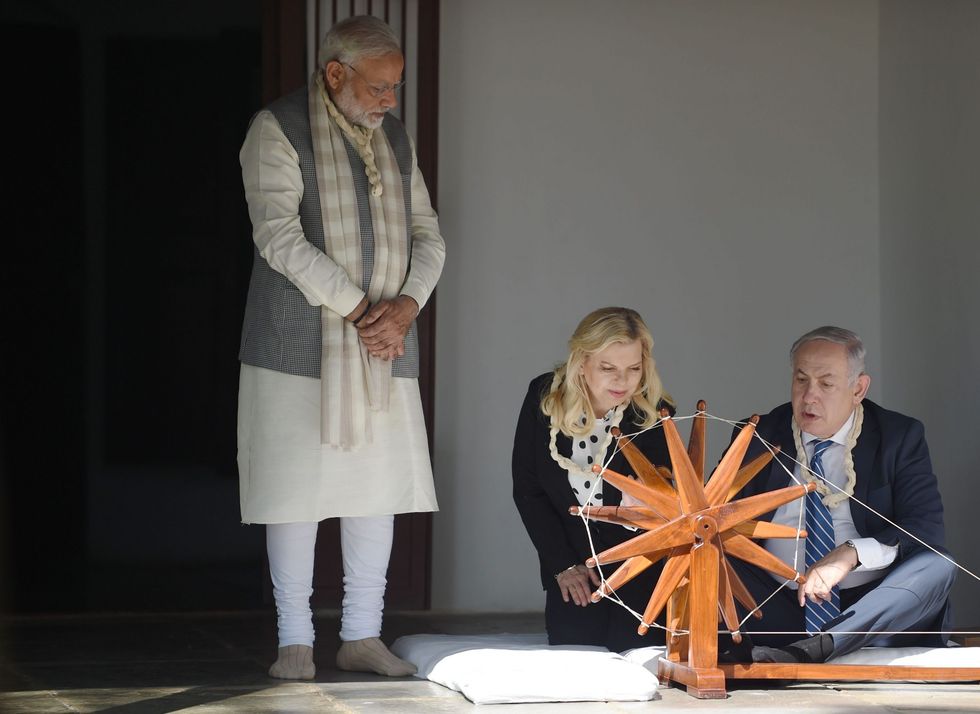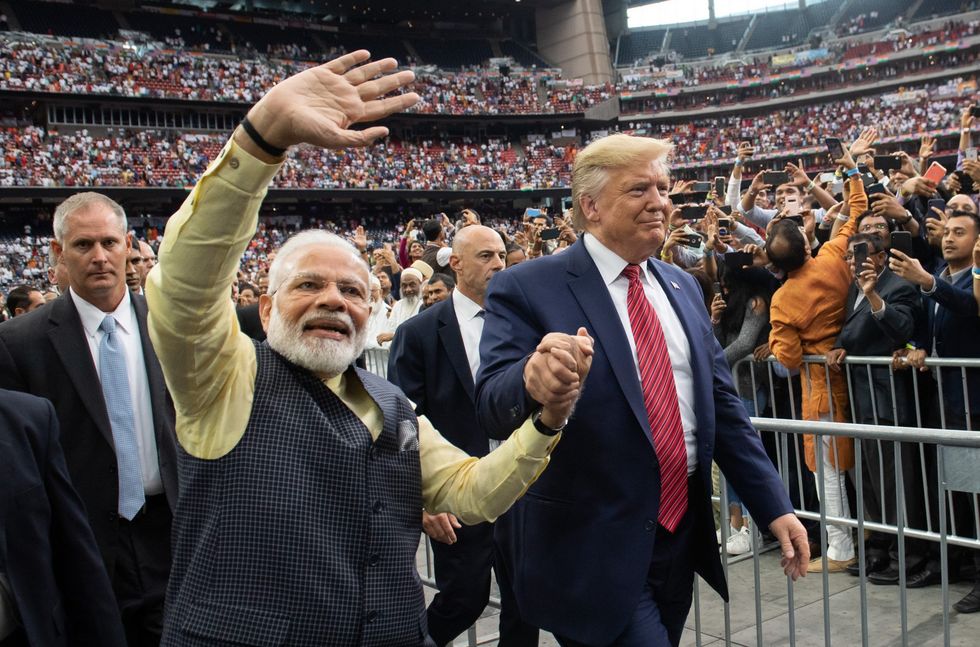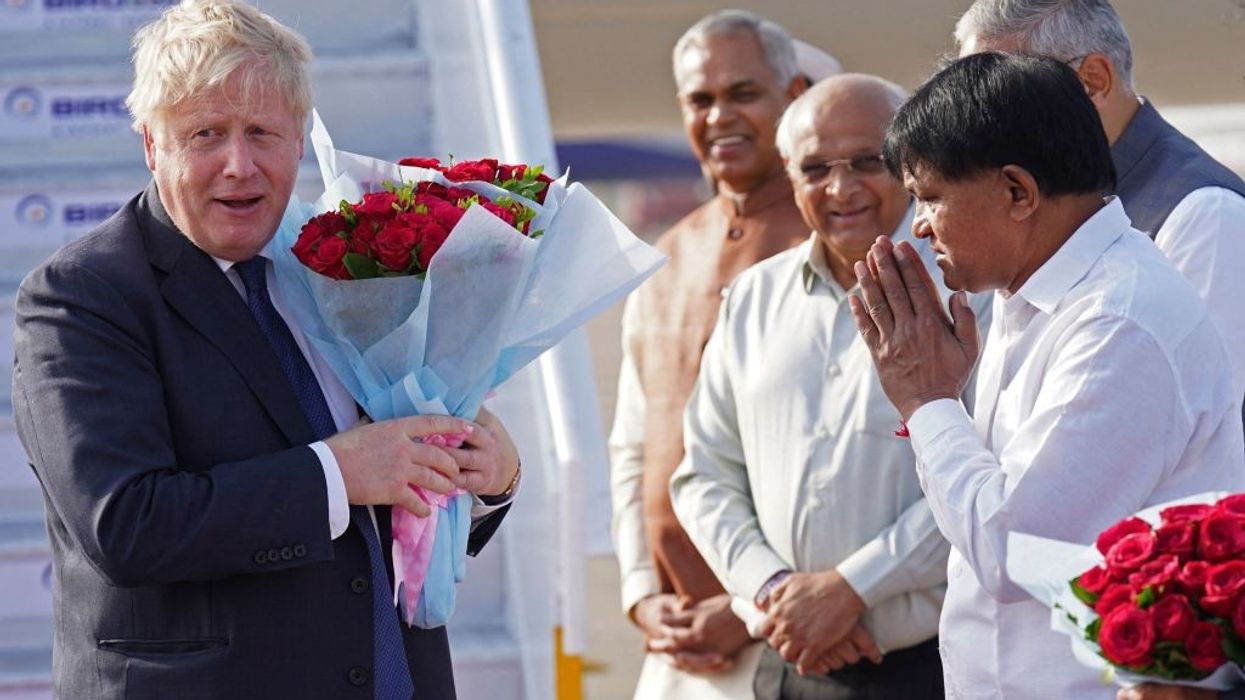BORIS JOHNSON was accorded a cordial welcome when he landed in Gujarat on Thursday (21) as the British prime minister began his two-day trip to India. But the pomp and publicity that generally marks top world leaders’ visits to the south Asian country was conspicuously missing.
Johnson was received at the Ahmedabad airport by Gujarat chief minister Bhupendra Patel and governor Acharya Devvrat. It was in stark contrast with the welcome given to Chinese leader Xi Jinping in 2014 and US president Donald Trump in February 2020 who were both received by prime minister Narendra Modi when they began their India visits from Gujarat.
Modi also personally received former Israeli prime minister Benjamin Netanyahu and former Japanese premier Shinzo Abe and accompanied them throughout their tour programmes in the western Indian state where he is from.
Gujarat, where Modi was a three-times chief minister, is also significant for Johnson as almost half of the Indian diaspora in the UK have their roots in the state.
Modi left Gujarat on Wednesday (20) evening and has chosen to receive the British leader in New Delhi.
While visuals of Modi and Jinping lounging in a swing in Ahmedabad set social media abuzz, the razzmatazz surrounding Trump’s stay in Gujarat has perhaps been unmatched by any other foreign leader in India.

Sandeep Shastri, a noted analyst, attributed the relatively tepid response to Johnson’s visit to the “history of tensions” between the two governments on a range of issues.
He cited the restrictions the British government imposed on Indian travellers during the pandemic as an example.
“The UK has also not been very sensitive to Indian perspectives during Covid-19,” Shastri told Eastern Eye.
Johnson’s predecessor Theresa May’s state visit in 2016 was also a low-key affair.
India is also at odds with the UK and other western powers amid the Russian invasion of Ukraine.
While the US-led NATO member states - including Britain - have unleashed a barrage of sanctions on Russia, India has stepped up its oil imports from Moscow, saying its ‘independent foreign policy’ is shaped by its needs.
New Delhi has also not explicitly condemned what Russia called “a special military operation” in Ukraine, but urged the warring countries to come to the negotiation table.

As Johnson went ahead with his first India trip as the prime minister, the fallout of the recent communal riots and Wednesday’s demolition drive in the national capital dominated Indian media.
Social media response to his visit also remained muted.
However, Johnson described his visit as “fantastic”.
“It’s fantastic to be in India, the world’s largest democracy. I see vast possibilities for what our great nations can achieve together. Our powerhouse partnership is delivering jobs, growth and opportunity. I look forward to strengthening this partnership in the coming days”, Johnson tweeted.
“I was honoured to follow in the footsteps of millions in visiting the Gandhi Ashram in Ahmedabad today. As the world faces renewed conflict, Mahatma Gandhi’s teachings remind us of the power of peace in changing the course of history”, he said in another tweet with a photo of him showing him placing a garland around a statue of Gandhi.
Should Modi’s absence from reception given to Johnson in Gujarat be seen as a snub?
Modi did not accompany Canadian prime minister Justin Trudeau when the latter visited the Indian leader’s home state of Gujarat in February 2018.
However, the Indian leader did welcome in person US president Donald Trump, Israel prime minister Benjamin Netanyahu, Japanese prime minister Shinzo Abe and Chinese president Xi Jinping when they travelled to Gujarat.
Key highlights of world leaders personally welcomed by Modi:
Ahmedabad: February 24, 2020
- Modi broke protocol and welcomed Trump and his family. Trump and Modi then conducted a 22-km-long roadshow from Ahmedabad Airport to Motera Stadium in the city.
- They addressed the 'Namaste Trump' programme at the stadium
- During this visit, both leaders also visited the Sabarmati Ashram.
Delhi: January 14, 2018
Modi broke protocol to receive his Israeli counterpart Benjamin Netanyahu and his wife Sara in Delhi.
- Modi welcomed Netanyahu with a hug upon his arrival.
- Modi and Netanyahu later attended a ceremony to rename Teen Murti Chowk in central Delhi as Teen Murti-Haifa Chowk.
- Modi also hosted a private dinner for Netanyahu and his wife.

Ahmedabad September 14, 2017
The prime minister broke protocol to receive Shinzo Abe and wife Akie Abe at the airport even as Gujarat chief minister Vijay Rupani and governor OP Kohli were present.
- Modi and Abe left the airport for Sabarmati Ashram in an open jeep, but not before Abe and wife changed into Indian attire.
- The eight-km long journey was turned into a massive roadshow as people lined up on both sides of the road and cheered the two leaders.
Ahmedabad, September 17, 2014
Modi hosted Chinese president Xi Jinping in Ahmedabad. However, Modi did not break protocol to receive the president and his wife at the airport. It was Gujarat chief minister Anandiben Patel and governor OP Kohli who received the visitors.
- Modi later met the Chinese president at a hotel in Ahmedabad and immediately proceeded to have a brief one-on-one discussion with him.
During Xi's visit to India, there was no elaborate road show for the visiting Chinese president. - The Chinese leader was taken around by Modi on a whirlwind business-cum-leisure trip, topped by a lavish Gujarati vegetarian dinner on the Sabarmati riverfront.
Tamil Nadu, October 11 2019
Chinese President Xi Jinping arrived at Chennai airport to hold a second informal summit with Prime Minister Narendra Modi in Mahabalipuram town of Tamil Nadu where the two leaders had tete-a-tete and also delegation-level talks to strengthen bilateral ties.
- The External Affairs Minister, S Jaishankar and National Security Advisor (NSA) Ajit Doval meet Xi Jinping, at Shore Temple in Mahabalipuram.
- Prime Minister Narendra Modi too met President Xi Jinping at the Shore Temple.
- Both leaders also visited Panch Rathas and the Group of Monuments in Mahabalipuram, a UNESCO World Heritage site.
- Locals held placards with pictures of PM Modi and Chinese President Xi Jinping and traditional folk musicians performed at East Coast Road.
- President Xi Jinping was served local fare which included Thakkali Rasam, Chettinad chicken, Arachavitta Sambar, Kadalai Kuruma, Dosa, idli and Idiyappam.
- The Chinese president was also greeted by Chinese nationals working in India who welcomed him outside a prominent hotel, in Chennai.
Ahmedabad, April 21, 2022
Boris Johnson is on his maiden visit to Gujarat. He was received by Gujarat chief minister Bhupendra Rajnikant Patel.
· After landing at Ahmedabad, Johnson visited the Sabarmati Ashram where he tried his hands on the charkha.
· He then met businessman Gautam Adani before flying to Vadodara, where he visited a plant of the heavy machine firm JCB.
· He then headed to Gandhinagar's Gujarat International Finance Tec-City or GIFT City.
· Johnson is scheduled to visit Delhi this evening where he will meet Modi, who only yesterday (20) concluded a three-day Gujarat visit from April 18.
· On Friday (22), he will meet Modi and hold talks on economic, security and defence ties.
(Compiled by Kimberly Rodrigues)




